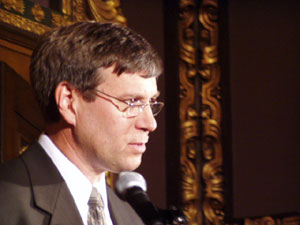|
Photos
More from MPR
Your Voice
|
Pawlenty taps South Dakota lottery chief for Minnesota job
September 23, 2004
 |
| Clint Harris rose through the ranks of the lottery after starting as a research analyst in 1993. Before that, he worked in the grocery business for 17 years. (MPR Photo/Michael Khoo) |
St. Paul, Minn. — It's been a tough year for the Minnesota Lottery. A Legislative Auditor's report released in February found significant instances of inefficiency, poor judgment, and some minor violations of state law. And as the auditor's office was completing its report, lottery director George Andersen committed suicide at his home in Hugo.
In selecting Clint Harris to take over, Gov. Pawlenty noted Harris's successes leading the South Dakota Lottery.
 | |||
"He has a remarkable track record of responsible stewardship and great ethics and solid revenue for the South Dakota Lottery. He's viewed nationwide as a leader in this industry," Pawlenty said.
Harris took over the South Dakota Lottery in 2000 and has posted revenue gains for the state for each of the past four years, leading to a record $115 million last fiscal year.
Video lottery games generate roughly 95 percent of those receipts. The Minnesota lottery isn't authorized to offer video lottery terminals. But Harris says he'd nonetheless like to multiply Minnesota's state lottery revenues two-and-a-half times, bringing in $250 million by 2024. He says the foundation for growth has already been set by reforms adopted in the wake of the auditor's critical report.
"They were presented with a difficult task to restructure the lottery and to reduce costs. And I think the results of that accomplishment are evident in the record $100 million transfer in this past fiscal year," he said.
That record transfer benefits general state programs as well as specific environmental accounts. It was engineered, in part, by Mike Vekich, who's led the agency on a interim basis since Andersen's death. Vekich will return to the private sector when Harris takes over the permanent job in October.
Vekich says he's adopted most of the auditor's recommendations for scrutinizing the agency's business practices and promotional efforts.
"We've also completed the first strategic plan as well as the first marketing and advertising plan for the agency. The business now is on solid ground," according to Vekich.
A task force is also studying additional safeguards to prevent abuses at the lottery. Sen. Ann Rest, DFL-New Hope, says that's likely to include a new lottery board to oversee operations at the agency. Rest says she's encouraged to see Harris starting his new job shortly, in time to offer his thoughts on what, if any, additional reforms are necessary.
"He'll have a chance to review the draft, give his comments, his suggestions, as we move foward, and give us the benefit of his experience in South Dakota," Rest said.
The lottery may also be asked to take on an expanded role in casino-style gambling if any of several proposals at the Legislature prevail. Numerous plans have called for video slot machines as part of joint ventures between the lottery and private companies or between the lottery and a coalition of northern Indian tribes.
Pawlenty says Harris's familiarity with video gaming is an added bonus in that regard, but wasn't something he actively sought in a new director. Pawlenty says it's still not clear what, if any, gambling initiatives might pass legislative muster.
"I think it would be premature to say the lottery will or won't have a role in that until we get a little further down the road in terms of the discussions with the tribal leaders and tribal communities and some other options that we're looking at. But it is possible that the lottery could have a role with that," Pawlenty said.
In the last year, Pawlenty has suggested that the state's Native American tribes should share a larger share of their gaming revenues or perhaps face competition from non-Indian competitors. And recently, several tribes have offered to discuss gambling options.
|
News Headlines
|
Related Subjects
|
